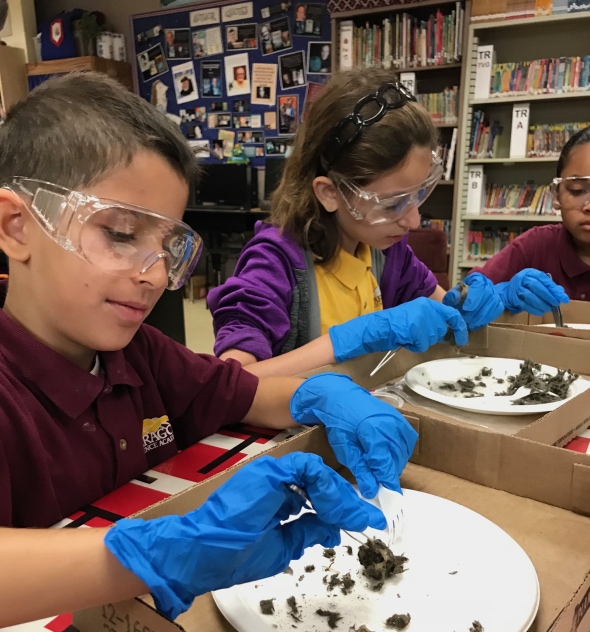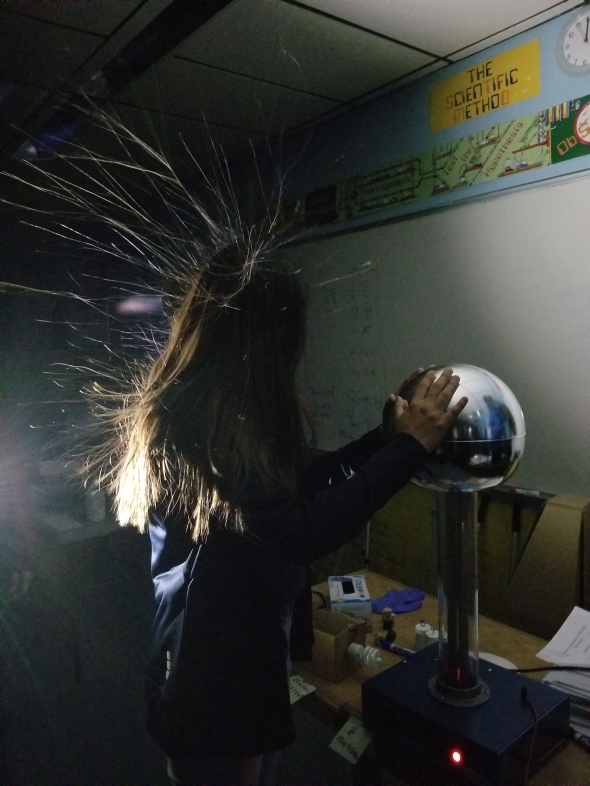What is a STEM School?
Hint: It is more than just Science, Technology, Engineering and Math.
STEM schools focus on the core skills that students need to succeed in a high tech world. With a focus on Science, Technology, Engineering, and Math (STEM), they position their students to flourish in the careers of the future.
Sonoran Schools teach more than just STEM classes though – they integrate STEM skills into every aspect of school culture. Faculty, staff, students, parents, and community supporters embody this culture, and recognize the opportunities presented by STEM for our nation’s workforce.
Does STEM Matter
Yes! There is a global shortage of science, technology, engineering, and math professionals. The number of jobs in STEM is rapidly increasing but to fill those STEM jobs, employers need critical thinkers and problem solvers who are well prepared to succeed in a STEM career.
What Does STEM Culture Look Like?
“Foster critical thinking, engaging all students in a rigorous, STEM-focused curriculum.”
A STEM-focused education is not just about programs; it is about a STEM culture.
STEM culture is not confined to science, technology, engineering, and mathematics classroom instruction. Instead, it is best described as the integration of STEM content into all subjects including art, physical education, social studies, and language arts.
The shared goal of Sonoran Schools is to break down stereotypes and ensure all learners, particularly those currently under-represented in STEM fields – including females, African-Americans, Hispanics, and English Learners – not only graduate with STEM skills but with the capacity to pursue a career in STEM.


A STEM-Based Curriculum
It emphasizes the application of knowledge to real life situations to help students learn. A STEM education integrates concepts that are usually taught as separate subjects in different classes.
There are 12 skills recognized as STEM skills:
Data Analysis & Interpretation
Metacognition
Information Literacy
Global Awareness
Problem-Solving
Initiative
Leadership
Flexibility
Creativity & Innovation
Critical Thinking
Collaboration
Communication
These skills are developed in all grade levels and disciplines at Sonoran Schools. Our teachers use real life situations to engage students in a way that empowers them in their lives, and helps to develop a lifelong passion for learning. Even extracurricular activities embed at least three STEM skills into the student experience.
The twelve STEM skills apply to all classroom environments, so non-STEM teachers have clear entry points to supporting a STEM-focused education. Indeed, teachers can do so without losing focus on the priorities of the subject they teach and care about, while fully supporting the larger STEM mission by helping students build success skills.
The development of critical thinking skills in K-12 is the foundation of student learning, academic progress, and future workplace success. When students apply prior experience, develop a strategy, and evaluate potential outcomes, they are using critical thinking skills to solve problems and make decisions.
This approach to problem solving is not, and should not, be restricted to math and science classrooms. The more students are supported and challenged to exercise their critical thinking skills, the stronger those skills become.
STEM Is The Foundation
The importance of a STEM-focused education is reflected in a unique option for high school students to graduate with a STEM Distinction on their diploma. To earn a STEM distinction, a student must meet these requirements:
Science courses (4 credits)
- Choose 1 physics, 1 biology, and 1 chemistry (includes AP courses)
- Choose one additional science course
Math courses (5 credits)
- Algebra 1, Geometry, Algebra 2, Pre-Calculus, and Calculus or higher
Engineering/Technology courses (3 credits)
- At least one credit must be an engineering or coding course
Senior STEM Capstone (1 credit)
STEM GPA of 3.0 or above (GPA of STEM courses on a 4.0 scale)
Evidence of 3 equivalent years of STEM extra-curricular participation during HS (e.g robotics, STEM Council, Science Olympiad) or STEM mentorship of younger students
Shadow a professional in a STEM career field for one day
- Choice of career must be in alignment with one of the ISEF STEM categories.
STEM Is Embedded At Sonoran Schools
We provide multiple skill-level mathematics courses, ensuring that each student is challenged appropriately, irrespective of grade level. Our science curriculum aligns with the Next Generation Science Standards to ensure our students have a rigorous and comprehensive science and engineering education, where science and engineering principles drive hypotheses.
From kindergarten through 12th grade, our students take computer science courses and master computer programming skills. All Sonoran Schools also provide 1:1 Technology, at all grade levels, to ensure digital literacy.
Chief Science Officer Program and STEM Council
We are proud of our partnership with the Arizona SciTech Institute in the unique and nationally recognized “School STEM Council” and “Chief Science Officer” programs. Each grade level has a student representative acting as a Science Officer on the student-lead school STEM Council. The council advocates for STEM activities, sets up school and community events, and communicates about STEM topics within the school community and in the broader community surrounding the school.

STEM-Focused Extracurricular Activities
Why should a love of Science, Technology, Engineering, and Math be limited to classroom time?
We provide a strong extra-curricular program that includes: FIRST ® Robotics, Science Olympiad, Future City, Kidstruction, and Odyssey of the Mind™. These esteemed programs offer multiple arenas for students to expand on classroom curriculum, complementing STEM skills with creative thinking and open-ended problem solving.
Sonoran Schools STEM At-A-Glance
Science
- NGSS aligned science and engineering curriculum
- Science Fair project for all students
- STEM Demo Projects
- Science Olympiad for Elementary, Middle, and High School
- Science Lab Kits for elementary, middle and high school project-based science classes
- Subject-specific science classes in middle school: 6th grade Earth Science, 7th Grade Life
- Science, 8th grade Physical Science
- Honors and Advanced Placement science classes
Mathematics
- Skill level math classes
- Advanced Placement classes at high schools
- Advanced Math program at middle schools
- Competition participation: MATHCOUNTS, American Mathematics Competition, Noetic Learning Math Contest, Math League, and Math Kangaroo
Technology / Engineering
- 1:1 technology to support digital literacy
- Computer Science K-12
-
- Engineering Pathway (High School)
AP Computer Science Principles (9 th Grade) - Introduction to Engineering Design (1.0) or Engineering 102 (1.0)
- Engineering Pathway (High School)
-
- Computer Science Pathway 1 Web Authoring (High School)
-
- AP Computer Science Principles (9 th Grade) and
- Web Authoring (.5) and one of the following:
- Mobile Apps
- Video Game Design
- Virtual Reality
- Digital Arts
-
- Computer Science Pathway 2 Coding and Networking (High School)
-
- AP Computer Science Principles (9 th Grade) and
- AP Computer Science A (1.0) or Introduction to CS in Python (.5) and Cybersecurity (.5)
-
- Competition opportunities: FIRST Lego League Challenge, FIRST Tech Challenge, FIRST Robotics, VEX Robotics Hummingbird Robotics
Be a Superhero To Our Schools
Support Our Students
Donations can range from monetary donations, to specific items (e.g. science equipment; playground equipment), to tax credit contributions.
